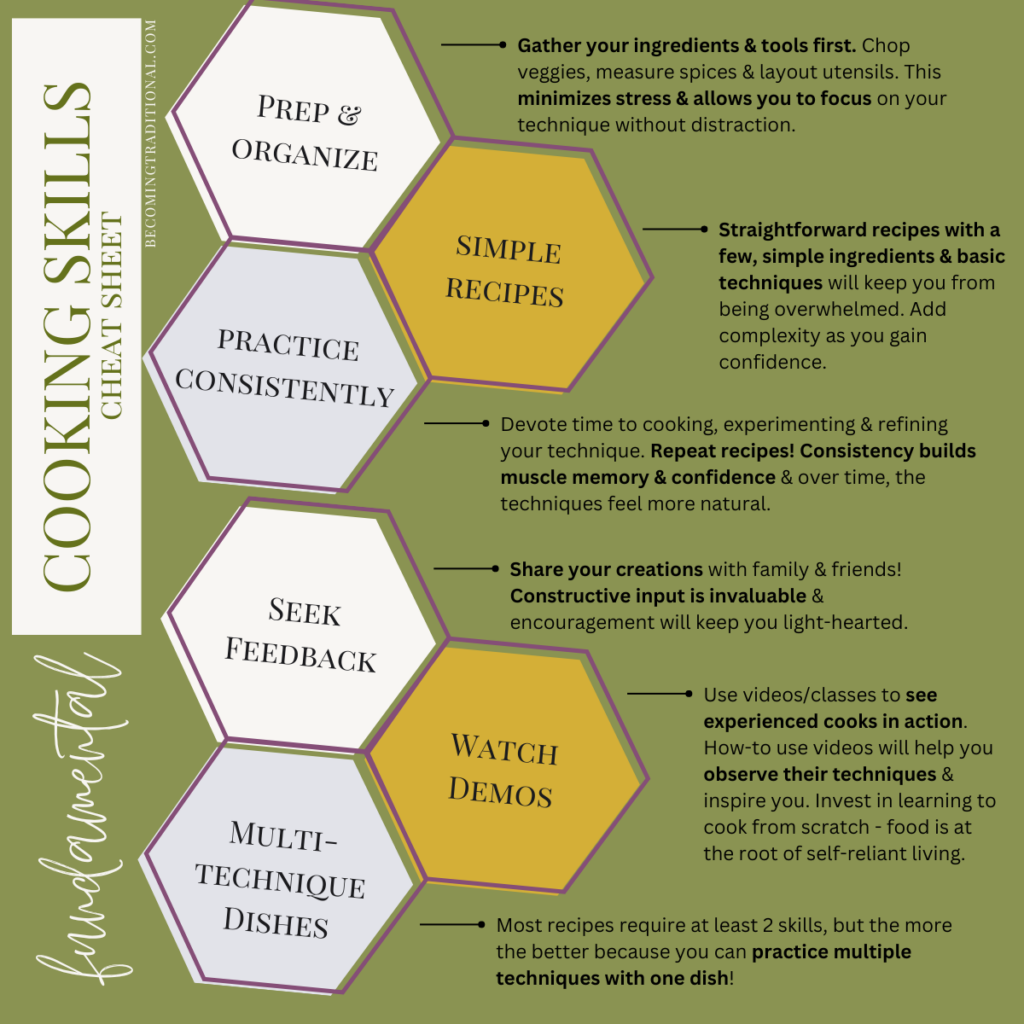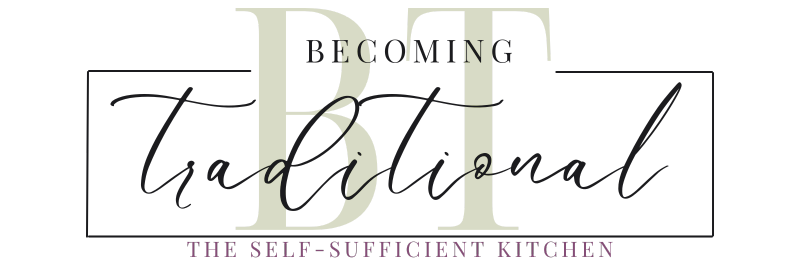You need basic cooking techniques to live a stronger self-sufficient lifestyle. Getting in the kitchen can be intimidating, but it doesn’t have to be. To set a solid foundation, mastering these simple techniques is key. It paves the way for you to build confidence & creativity in your kitchen.
Plus, it’s actually pretty exciting to know that leaning into these skills is going to help you be more self-reliant. And that’s just the tip of how your kitchen becomes the powerhouse of your journey.
This post may contain affiliate links. As an Amazon Associate I earn commissions from qualifying purchases made through links on this post at no extra cost to you. Click here to read my full disclosure.
The Importance of Basic Cooking Techniques
If you’re standing at the threshold of your kitchen journey, peering into the world of pots, pans, and endless possibilities, you’re in the right place.
Cooking isn’t just a skill; it’s an art – a place to be creative.
It’s a science – a place to follow some strong guidelines.
And best of all, it’s a delicious journey of self-discovery.
Learning your way around the kitchen you cook in is a great personal growth exercise.
Cooking is a way to celebrate the ingredients that nourish us. And techniques are the foundational skills that build the framework for our cooking adventures.
Starting with beginner cooking skills is your step into greater kitchen independence. But it’s important to master these slowly, over time so you enjoy your time in the kitchen. Especially since that’s where you may spend a lot of time as you grow more self-reliant.
One skill at a time. Apron on – or not. Knives at the ready. Let’s talk about the basics.
6 Beginner Cooking Skills to Learn

These techniques are fundamental to cooking from scratch in the kitchen. Despite this lovely graphic, they don’t necessarily build off one another.
So, jump in where you feel most comfortable & work your way out from there. You can work on one or two (or more) at a time.
The best advice I have to master these skills is repetition, repetition, repetition.
Over time. I can’t stress that part enough.
Mastering a skill, especially a new one, takes time.
Don’t be in a rush or merely try to check something off your list.
Just like frozen ribs take time to become tender, you need to give yourself the space to actually practice these things consistently. Only then should you consider yourself proficient.
And how long that takes depends on how often you use the skill, but I generally aim for 6 months to 1 year.
1. Knife Skills: The Foundation of From-scratch Cooking
You need a good quality knife in the kitchen, but it’s the knife skills that are the cornerstone of cooking.
There’s dicing, slicing, and chopping. And each one brings a little something different to your dishes.
When it comes to mastering knife skills for beginners, you need to learn the proper grip and practice safety. You’ll soon discover how finely tuned knife skills can significantly impact the texture and presentation of your meals.
And FYI, it’s also important to know how to sharpen your knife too.
2. Sautéing & Searing: The Heart of Culinary Art
Who doesn’t love a great sizzle? I think of a nice hearty steak when it hits a hot pan and makes that nice crackling sound. It’s music to my taste buds.
Sautéing and searing are two beginner-friendly cooking methods that enhance flavor and texture. And for some meals, that’s truly everything.
You can achieve the perfect sear on meats or sauté vegetables to perfection. These skills can touch every part of a delicious and well-balanced meal.
3. Boiling & Steaming: From Al Dente to Perfectly Cooked

If it sounds ultra basic, it’s because it is. These two are a classic duo of cooking skills for beginners.
And if you read between the lines, I’m telling you to learn the science of cooking with water.
Yep. Water.
Boiling and steaming happens in levels so that you achieve optimal results with grains, pasta, and vegetables.
It’s the science (and the timing) behind these methods that guarantees your ingredients are cooked to perfection every time.
4. Braising & Simmering: The Slow and Delicious
Ok, stay with me because I know I might lose you with the term “braising”. But it’s simple.
Braising is a combination-cooking method that uses both wet and dry heats. Food is usually browned first at a high temperature, then simmered (the second part of this skill duo) in a covered pot in cooking liquid. Think “stewing” but with less liquid and usually with larger cuts of meat. The end result is succulent, deliciously tender and mouth-watering meat.
These two techniques are all about taking a tough cut of meat and transforming it into a melt-in-your-mouth experience. It’s like crock-pot cooking, but on a stove. Without the crockpot…
Low and slow cooking helps develop rich flavors and tenderize ingredients. BUT it’s also beneficial to your digestive system as it cuts down on some of the work your body has to do.
5. Roasting & Baking: Essentials Cooking Skills
Let’s hop off the stovetop and into the oven!
These basic cooking techniques are how we enjoy golden roasted vegetables and perfectly baked desserts. Learning these skills is how you add depth and flavor to your repertoire.
Take advantage of your oven and gain a little more hands-free kitchen time.
6. Stock & Sauce Making: the Foundation of Flavor
Stocks and sauces are some of your building blocks to countless recipes. So if you learn to create a flavorful stock from scratch, you’ll enhance the taste of your meals.
Sauces are the star of the plate. Practicing your from-scratch sauce making skills is a way to master another fundamental culinary technique and a way to elevate your presentation.
So just what is the difference between a stock and broth? Or sauce?
Stocks are usually made from bones whereas broths are typically made from meat. But they both are extremely flavorful since they’re joined by aromatics. Aromatics are any combination of herbs, spices and vegetables that add flavor (& aroma!) to a dish. Think, carrots, bay leaves or peppercorns.
Tips to Help You Master Foundational Cooking Skills
Mastering these basic cooking techniques is how you set the tone of what your kitchen can achieve. And as you practice and experiment, they become second nature. That will empower you to create delicious, nutritious meals with confidence so you can rinse, repeat & eat again. Here are more tips for boosting your kitchen confidence.
A. Prepare & Organize beforehand
Before you start cooking, gather and organize all the ingredients and tools you’ll need. This includes chopping vegetables, measuring spices, and having utensils ready.
This minimizes stress during the cooking process. Plus it allows you to focus on mastering a certain technique without the distraction of searching for ingredients or tools.
B. Start with Simple Recipes
Straightforward recipes that involve only a few ingredients and basic techniques is low-hanging fruit. So, go for a few easy wins to gain some momentum.
This way you can focus on the basics without feeling overwhelmed. As you gain confidence, gradually progress to more complex dishes as you gradually build up your skills.
C. Practice Consistently
Regular practice is key to mastering any skill. You need to devote time to cook, experiment, and refine your techniques. And don’t be afraid to repeat recipes to reinforce your understanding! Remember, cooking is an art too.
Consistent practice builds muscle memory and confidence. This makes each technique feel more natural over time.
D. Seek Feedback
Share your creations with friends or family and ask for feedback. Constructive input is beyond valuable as you continue growing. Plus, the added encouragement will keep you light-hearted too.
E. Watch Demonstrations
Watch cooking tutorials, either online or on cooking shows, to see experienced chefs in action. Observing their techniques will help your understanding and inspire your cooking. Invest in learning to cook from-scratch because food is one of the roots of self-reliant living.
F. Make dishes that require several cooking techniques.
This isn’t revolutionary because as you’ll discover, most recipes use multiple techniques anyway. But it’s one way to really level up your beginner cooking skills. I’ve given you two examples to try below.

Bonus: Recipes to Try to Master Your Basic Cooking Techniques
Basic Recipe #1 – Chicken & Veggie Stir-Fry over Rice
This dish uses 3 of the basic cooking skills. Making it allows you to integrate knife skills, sautéing, and boiling or steaming. Plus, in the end you have a well-balanced meal to enjoy too. And it’s a great way to use leftovers, a simple way to easily reduce food waste in the kitchen!
SKILLS IN ACTION:
Knife Skills (Chopping)
Use knife skills to chop chicken into bite-sized pieces and vegetables into uniform slices or dices.
Sautéing
Sauté the chopped chicken and vegetables in a hot pan with oil, enhancing their flavors through quick cooking over medium-high heat.
Boiling or Steaming (Rice)
Boil or steam the rice. You can flavor it with butter, herbs & a dash of rice wine vinegar or leave it plain. Either way, serve it as a fluffy base for the stir-fry.
Basic Recipe #2 – Roasted Vegetable Pasta with Homemade Tomato Sauce
Alright, this dish incorporates knife skills, roasting and sauce-making. It might sound complicated, but a dish like this calls for simple ingredients & basic techniques.
SKILLS IN ACTION:
Knife Skills (Chopping)
Use knife skills to chop a variety of vegetables like bell peppers, zucchini, and cherry tomatoes into bite-sized pieces.
Roasting
Roast the chopped vegetables in the oven until they are caramelized and have a rich, roasted flavor.
Sauce Making
Create a homemade tomato sauce using basic sauce-making techniques like sautéing veggies & simmering until complete. Of course you’ll need to season to taste, but this will bind your dish.
Remember, mastering cooking techniques is an ever-evolving process that has highs and lows like any other journey.
Celebrate your successes, learn from the challenges and enjoy the delicious outcomes of honing your skills in the kitchen!
After all, you’ve got this, Lovely.
But don’t just read — roll up your sleeves, get in your kitchen and share your triumphs with the community in the comments below!

🌱 Start Small. Start Now. Start where you are with what you have. The rest will follow. 🌱

Is being more self-sufficient something you’re interested in but don’t know where to start?
The Self-Sufficient Roadmap is for you!
Designed it to eliminate some of the overwhelm, find out exactly where you are & what to look forward to next.
Wanna add the quick-view cards from this post to your kitchen journal?
Click below to download them both now!



Leave a Reply